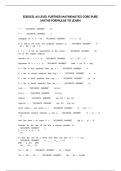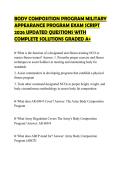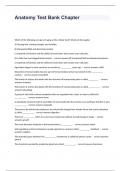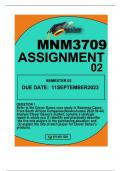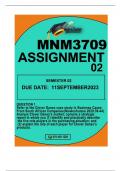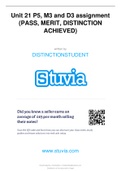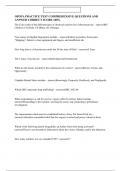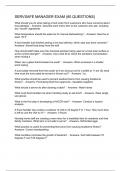1.The Information Processing Theory
Provides a comprehensive framework for
understanding how individuals acquire,
process, store, and retrieve information. It
views the mind as an information processing
system that actively engages with stimuli from
the environment. The theory posits that
cognitive processes operate sequentially to
transform sensory input into meaningful
information and ultimately store it in long-term
memory for future retrieval.One key aspect of
the Information Processing Theory is the
concept of attention. Attention refers to the
selective focus and allocation of cognitive
resources to specific stimuli in the
environment. Researchers have explored
different attentional processes, such as
EDS3701
selective attention, divided attention, and
sustained attention (Posner, 2012).
Understanding attentional mechanisms is
crucial for teachers as they can design
instructional strategies that capture and
ASSIGNMENT 3 S1 2023 maintain students' attention, ensuring optimal
engagement with the learning material.
NATALIE FOXX
, WHATSAPP 0845251828
a) Information Processing Theory and Theory of Human Motivation
1.The Information Processing Theory
Provides a comprehensive framework for understanding how individuals acquire,
process, store, and retrieve information. It views the mind as an information processing
system that actively engages with stimuli from the environment. The theory posits that
cognitive processes operate sequentially to transform sensory input into meaningful
information and ultimately store it in long-term memory for future retrieval.
One key aspect of the Information Processing Theory is the concept of attention.
Attention refers to the selective focus and allocation of cognitive resources to specific
stimuli in the environment. Researchers have explored different attentional processes,
such as selective attention, divided attention, and sustained attention (Posner, 2012).
Understanding attentional mechanisms is crucial for teachers as they can design
instructional strategies that capture and maintain students' attention, ensuring optimal
engagement with the learning material.
The theory also highlights the role of perception in learning. Perception involves
interpreting and making sense of sensory information. Perception is influenced by
factors such as prior knowledge, expectations, and schema activation. By
understanding how perception works, teachers can present information in ways that
facilitate comprehension and meaningful processing.
Memory is another critical aspect of the Information Processing Theory. It proposes that
information passes through a series of memory stores: sensory memory, short-term
memory, and long-term memory. Sensory memory briefly holds incoming sensory
information, while short-term memory temporarily stores information for immediate use.
Long-term memory is responsible for the storage of information over extended periods.
Within long-term memory, the theory distinguishes between procedural memory
(knowledge of how to do something) and declarative memory (knowledge of facts and
events). Further, the theory recognizes the importance of encoding, the process of
converting information into a format suitable for storage, and retrieval, the process of
accessing stored information.

